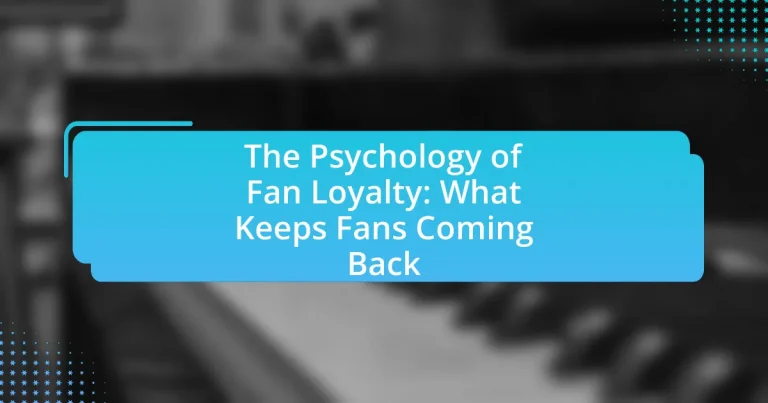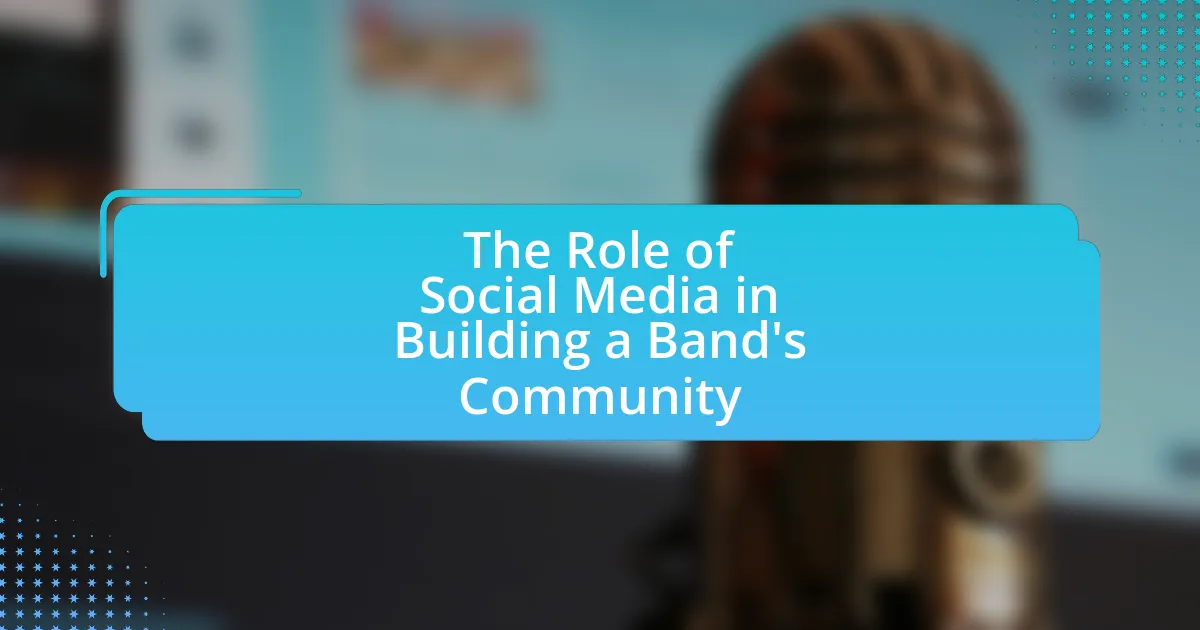The article explores the psychology of fan loyalty, examining the emotional and cognitive factors that drive individuals to consistently support specific teams, brands, or entertainment entities. It discusses how fan loyalty develops over time through emotional attachment, community engagement, and shared experiences, highlighting the significance of nostalgia and social identity in reinforcing this loyalty. Additionally, the article outlines the impact of fan loyalty on organizational revenue and brand growth, emphasizing strategies for fostering and maintaining loyalty through personalized experiences and effective communication. Key drivers of fan loyalty, such as emotional connections and community involvement, are also analyzed, providing insights into how organizations can leverage these factors to enhance fan engagement and retention.
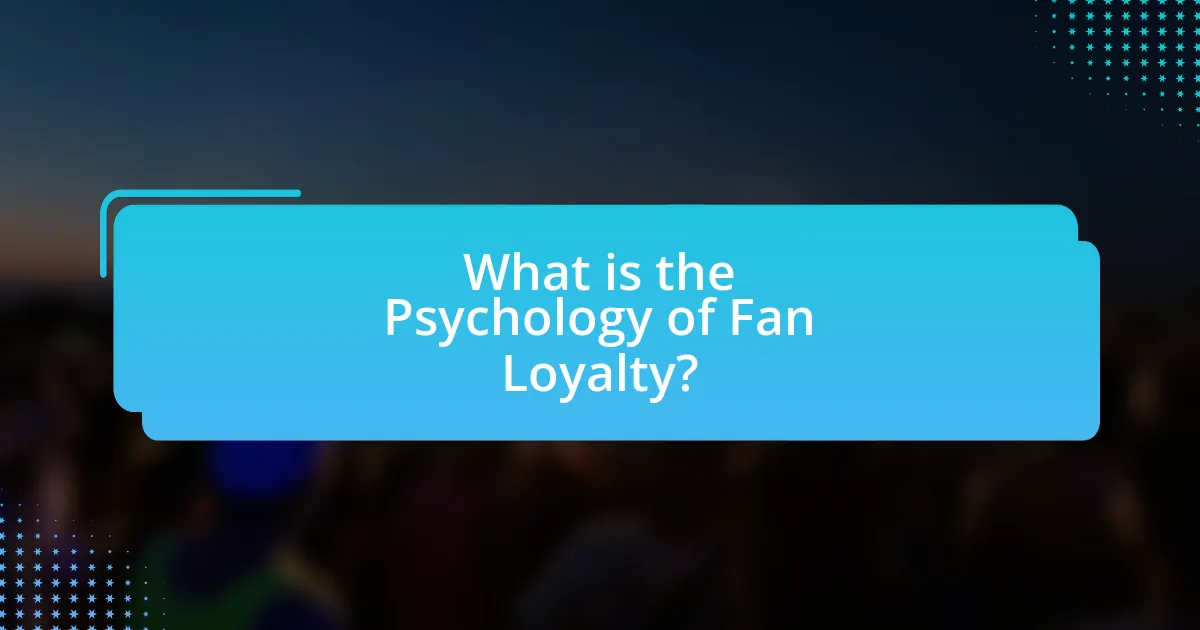
What is the Psychology of Fan Loyalty?
The psychology of fan loyalty refers to the emotional and cognitive factors that drive individuals to consistently support a particular team, brand, or entertainment entity. This loyalty is often rooted in a sense of identity, belonging, and community, where fans derive personal satisfaction and social connections from their affiliation. Research indicates that factors such as nostalgia, social identity theory, and emotional attachment significantly influence fan loyalty. For instance, a study published in the Journal of Sport Management by Funk and James (2001) highlights that fans develop loyalty through emotional experiences and social interactions related to their teams, reinforcing their commitment over time.
How does fan loyalty develop over time?
Fan loyalty develops over time through a combination of emotional attachment, consistent engagement, and shared experiences. Initially, fans may be drawn to a team or brand due to performance or personal connections, but as they engage more deeply—through attending games, participating in fan communities, or consuming related media—their emotional investment grows. Research indicates that repeated positive interactions, such as winning seasons or memorable events, reinforce this loyalty, creating a sense of belonging and identity tied to the team. For example, a study published in the Journal of Sport Management found that fans who regularly attend games report higher levels of emotional attachment and loyalty, demonstrating that ongoing engagement is crucial for developing long-term fan loyalty.
What psychological factors contribute to the formation of fan loyalty?
Psychological factors that contribute to the formation of fan loyalty include emotional attachment, social identity, and cognitive dissonance. Emotional attachment arises when fans develop a strong personal connection to a team or brand, often influenced by shared experiences and memories. Social identity plays a crucial role as fans often derive a sense of belonging and self-esteem from their association with a team, which is supported by social identity theory, indicating that group membership enhances self-concept. Cognitive dissonance occurs when fans justify their loyalty despite negative experiences, reinforcing their commitment through rationalization. These factors collectively create a robust framework for understanding why fans remain loyal over time.
How do personal experiences shape an individual’s loyalty to a team or brand?
Personal experiences significantly shape an individual’s loyalty to a team or brand by creating emotional connections and reinforcing identity. When individuals have positive experiences, such as memorable events or personal achievements associated with a team or brand, they are more likely to develop a strong attachment. Research indicates that emotional engagement, driven by personal experiences, leads to increased loyalty; for instance, a study published in the Journal of Consumer Research found that consumers who have meaningful interactions with a brand are more likely to exhibit brand loyalty. These experiences can include attending games, participating in community events, or receiving exceptional customer service, all of which contribute to a sense of belonging and identity tied to the team or brand.
Why is understanding fan loyalty important for organizations?
Understanding fan loyalty is crucial for organizations because it directly influences revenue, brand strength, and customer retention. Organizations that grasp the dynamics of fan loyalty can tailor their marketing strategies to enhance engagement, leading to increased sales and long-term support. For instance, a study by the Harvard Business Review found that loyal customers are worth up to ten times their initial purchase, highlighting the financial impact of fostering loyalty. Additionally, organizations that understand fan loyalty can create targeted experiences that resonate with their audience, further solidifying their market position and driving sustainable growth.
What impact does fan loyalty have on revenue and brand growth?
Fan loyalty significantly enhances revenue and brand growth by fostering repeat purchases and increasing customer lifetime value. Loyal fans are more likely to spend on merchandise, tickets, and experiences, contributing to a steady revenue stream. For instance, a study by the Harvard Business Review found that increasing customer retention rates by just 5% can lead to a profit increase of 25% to 95%. Additionally, loyal fans often act as brand advocates, promoting the brand through word-of-mouth and social media, which can lead to new customer acquisition and further brand expansion. This dynamic illustrates how fan loyalty directly correlates with financial success and market presence.
How can organizations leverage fan loyalty for marketing strategies?
Organizations can leverage fan loyalty for marketing strategies by creating personalized experiences that resonate with their dedicated audience. By utilizing data analytics to understand fan preferences and behaviors, organizations can tailor marketing campaigns that enhance engagement and foster deeper connections. For instance, a study by the Harvard Business Review found that companies with high customer loyalty can see a 5% increase in customer retention leading to a 25% to 95% increase in profits. Additionally, organizations can implement loyalty programs that reward fans for their continued support, thereby incentivizing repeat purchases and brand advocacy. This approach not only strengthens the emotional bond between fans and the brand but also drives sustainable growth through word-of-mouth marketing and community building.
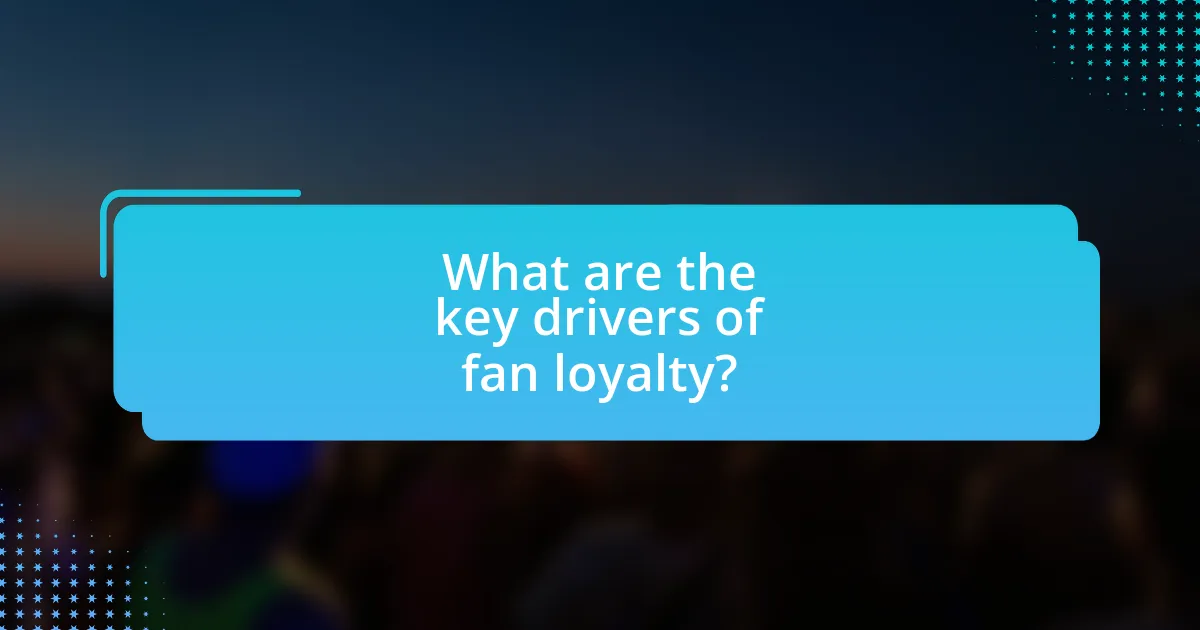
What are the key drivers of fan loyalty?
The key drivers of fan loyalty include emotional connection, community engagement, and consistent performance. Emotional connection arises when fans identify with a team’s values, history, or players, fostering a sense of belonging. Community engagement is crucial as fans often form social bonds through shared experiences, such as attending games together or participating in fan clubs. Consistent performance, including winning records and competitive play, reinforces loyalty by validating fans’ emotional investments. Research indicates that these factors significantly influence fan retention, with studies showing that emotional attachment can increase loyalty by up to 50%.
How do emotional connections influence fan loyalty?
Emotional connections significantly enhance fan loyalty by fostering a sense of belonging and attachment to a team or brand. When fans feel emotionally invested, they are more likely to engage consistently, attend events, and support the team through both victories and defeats. Research indicates that fans who identify emotionally with a team exhibit higher levels of commitment and are less likely to switch allegiances; for instance, a study published in the Journal of Sport Management found that emotional attachment directly correlates with loyalty behaviors, such as purchasing merchandise and attending games. This emotional bond creates a community among fans, reinforcing their loyalty through shared experiences and collective identity.
What role does nostalgia play in maintaining fan loyalty?
Nostalgia plays a significant role in maintaining fan loyalty by creating emotional connections that reinforce attachment to a brand, team, or franchise. This emotional bond is often rooted in shared memories and experiences associated with past events, which can evoke feelings of comfort and belonging. Research indicates that nostalgia can enhance positive feelings towards a brand, leading to increased loyalty; for instance, a study published in the Journal of Consumer Research found that nostalgic feelings can increase consumers’ willingness to pay for products linked to those memories. By tapping into these nostalgic sentiments, organizations can foster a deeper commitment among fans, encouraging them to remain loyal over time.
How do shared experiences among fans enhance loyalty?
Shared experiences among fans enhance loyalty by creating a sense of community and belonging. When fans participate in events, celebrations, or discussions together, they forge emotional connections that deepen their attachment to the team or brand. Research indicates that social identity theory supports this, showing that individuals derive part of their self-esteem from their group memberships. For example, a study published in the Journal of Sport Management found that fans who engage in communal activities, such as attending games or participating in fan clubs, report higher levels of loyalty and commitment to their teams. This collective engagement fosters a shared identity, reinforcing loyalty through mutual support and shared memories.
What social factors contribute to fan loyalty?
Social factors that contribute to fan loyalty include community belonging, social identity, and interpersonal relationships. Community belonging fosters a sense of connection among fans, creating a shared experience that enhances loyalty. Social identity theory suggests that fans derive part of their self-concept from their association with a team or brand, leading to increased commitment. Interpersonal relationships, such as friendships formed through shared fandom, further strengthen loyalty by providing emotional support and shared enjoyment. Research indicates that fans who engage in social interactions related to their fandom are more likely to remain loyal, as these connections reinforce their commitment to the team or brand.
How does community involvement affect fan loyalty?
Community involvement significantly enhances fan loyalty by fostering a sense of belonging and connection among fans. When organizations engage with their local communities through events, charitable initiatives, or outreach programs, they create opportunities for fans to interact with each other and the team in meaningful ways. This engagement leads to increased emotional investment, as fans feel they are part of a larger mission or cause. Research indicates that fans who participate in community activities related to their favorite teams are more likely to develop a strong attachment, as evidenced by a study published in the Journal of Sport Management, which found that community engagement positively correlates with fan loyalty metrics such as attendance and merchandise purchases.
What is the significance of social identity in fan loyalty?
Social identity significantly influences fan loyalty by fostering a sense of belonging and community among fans. This connection enhances emotional attachment to teams or brands, as fans often derive part of their self-concept from their affiliations. Research indicates that fans who identify strongly with a team are more likely to exhibit loyalty behaviors, such as attending games and purchasing merchandise. For instance, a study published in the Journal of Sport Management found that social identity directly correlates with increased fan engagement and commitment, demonstrating that fans who see themselves as part of a team’s identity are more likely to remain loyal over time.
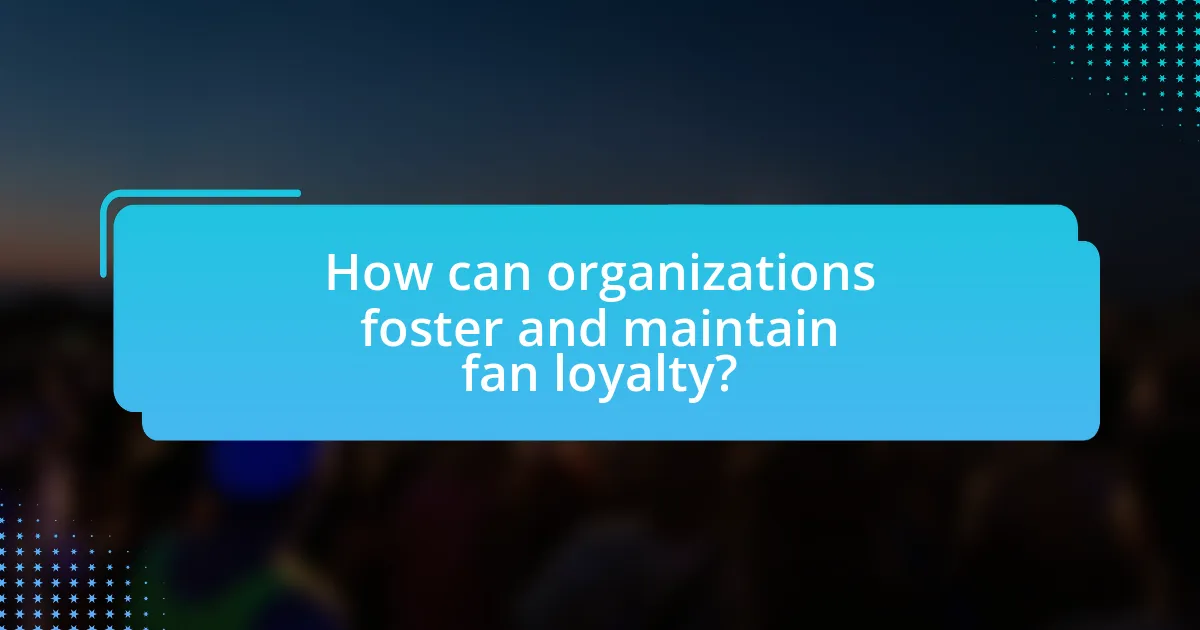
How can organizations foster and maintain fan loyalty?
Organizations can foster and maintain fan loyalty by creating meaningful engagement through personalized experiences and consistent communication. By understanding fan preferences and behaviors, organizations can tailor their offerings, such as exclusive content, rewards programs, and interactive events, which enhance the emotional connection fans feel towards the brand. Research indicates that 70% of consumers are more likely to recommend a brand with a loyalty program, demonstrating the effectiveness of such strategies in building lasting relationships. Additionally, maintaining transparency and addressing fan feedback fosters trust, further solidifying loyalty.
What strategies can be implemented to enhance fan engagement?
To enhance fan engagement, organizations can implement strategies such as personalized communication, interactive content, and community-building initiatives. Personalized communication, such as tailored emails and targeted social media interactions, fosters a sense of connection and relevance among fans. Interactive content, including polls, quizzes, and live Q&A sessions, encourages active participation and keeps fans invested in the experience. Community-building initiatives, like fan clubs and online forums, create a sense of belonging and loyalty, as fans connect with each other and share their passion. Research indicates that organizations that prioritize these strategies see increased fan retention and satisfaction, as evidenced by a study from the Journal of Sport Management, which highlights the correlation between fan engagement strategies and loyalty metrics.
How can personalized experiences improve fan loyalty?
Personalized experiences can significantly improve fan loyalty by creating a deeper emotional connection between fans and the brand or team. When fans receive tailored content, offers, or interactions that resonate with their preferences and behaviors, they feel valued and understood, which enhances their overall experience. Research indicates that 80% of consumers are more likely to make a purchase when brands offer personalized experiences, demonstrating the effectiveness of this approach in fostering loyalty. By leveraging data analytics to understand fan preferences, organizations can deliver customized communications and rewards, leading to increased engagement and long-term commitment from fans.
What role does communication play in building fan relationships?
Communication is essential in building fan relationships as it fosters engagement, trust, and loyalty. Effective communication allows organizations to connect with fans on a personal level, addressing their needs and preferences, which enhances their overall experience. For instance, research indicates that brands that actively engage with their audience through social media see a 20% increase in fan loyalty, as fans feel valued and heard. This two-way communication not only strengthens emotional bonds but also encourages fans to become advocates for the brand, further solidifying their loyalty.
What are common pitfalls organizations should avoid in managing fan loyalty?
Organizations should avoid neglecting communication with fans, as this can lead to disengagement. Effective communication fosters a sense of belonging and keeps fans informed about updates and events. Additionally, organizations should not overlook the importance of personalized experiences; failing to tailor interactions can make fans feel undervalued. Research indicates that 80% of consumers are more likely to make a purchase when brands offer personalized experiences. Another pitfall is ignoring fan feedback; organizations that do not actively seek and respond to fan input risk alienating their audience. A study by the Harvard Business Review found that companies that prioritize customer feedback see a 10-15% increase in customer loyalty. Lastly, organizations should avoid inconsistent branding, as mixed messages can confuse fans and diminish trust. Consistency in branding reinforces loyalty, as fans are more likely to remain loyal to brands that present a unified identity.
How can neglecting fan feedback harm loyalty?
Neglecting fan feedback can significantly harm loyalty by creating a disconnect between the fans and the brand or organization. When fans feel their opinions and experiences are ignored, they may perceive the brand as unresponsive or indifferent, leading to decreased emotional investment. Research indicates that 70% of consumers are more likely to remain loyal to a brand that actively seeks and values their feedback. This lack of engagement can result in fans disengaging, reducing their support, and ultimately choosing competitors who prioritize their input.
What are the consequences of inconsistent brand messaging on fan loyalty?
Inconsistent brand messaging negatively impacts fan loyalty by creating confusion and distrust among fans. When a brand fails to deliver a coherent message, fans may struggle to understand the brand’s values and identity, leading to a weakened emotional connection. Research indicates that 60% of consumers feel frustrated when brands provide inconsistent messaging, which can result in decreased engagement and loyalty. This disconnect can ultimately drive fans to competitors who present a more unified and reliable brand image.
What practical tips can organizations use to strengthen fan loyalty?
Organizations can strengthen fan loyalty by implementing personalized engagement strategies. Tailoring communication and experiences to individual fan preferences fosters a deeper emotional connection. For instance, research shows that 80% of consumers are more likely to make a purchase when brands offer personalized experiences (Epsilon, 2018). Additionally, creating exclusive content or rewards for loyal fans enhances their sense of belonging and appreciation. A study by the Harvard Business Review indicates that increasing customer retention rates by just 5% can lead to a profit increase of 25% to 95%. Therefore, organizations should focus on personalized interactions and exclusive offerings to effectively build and maintain fan loyalty.
How can organizations create loyalty programs that resonate with fans?
Organizations can create loyalty programs that resonate with fans by personalizing rewards and experiences based on fan preferences and behaviors. Tailoring incentives to individual interests increases emotional engagement, as evidenced by a study from the Journal of Marketing Research, which found that personalized marketing can boost customer loyalty by up to 20%. Additionally, incorporating gamification elements, such as challenges and leaderboards, fosters a sense of community and competition among fans, enhancing their connection to the brand. Research from the Harvard Business Review indicates that gamified loyalty programs can increase participation rates by 30%. By leveraging data analytics to understand fan demographics and preferences, organizations can design loyalty programs that not only meet but exceed fan expectations, ultimately driving long-term loyalty.
What are effective ways to celebrate fan milestones and achievements?
Effective ways to celebrate fan milestones and achievements include hosting special events, offering exclusive merchandise, and recognizing fans on social media platforms. Hosting events, such as fan appreciation days or meet-and-greets, fosters community and strengthens emotional connections, as evidenced by numerous sports teams that report increased fan loyalty following such gatherings. Exclusive merchandise, like limited-edition items, not only rewards dedicated fans but also enhances their sense of belonging, as shown by studies indicating that fans who possess unique memorabilia feel a stronger attachment to their teams. Additionally, public recognition on social media platforms can create a sense of pride and validation among fans, reinforcing their loyalty and encouraging continued engagement.












